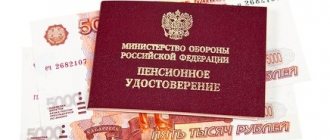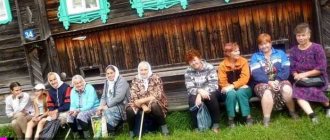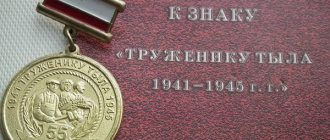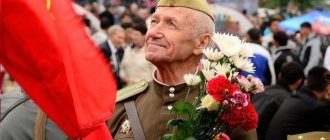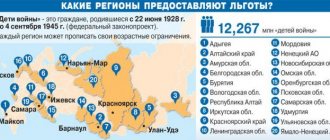Who is the beneficiary
All issues related to status, support measures and benefits are enshrined in Federal Law No. 5-FZ.
Combat veterans are a fairly broad category of citizens. So, these include:
- Military personnel who were sent to perform special tasks in Syria since September 30, 2020. Such military personnel had to serve the period established upon deployment, or be seconded for valid reasons.
- Military personnel who were sent to work in Afghanistan during combat operations there. This period is considered to be 1979–1989. Such military personnel had to serve the period established upon deployment, or be seconded for valid reasons.
- Employees who were part of automobile battalions that delivered cargo to the territory of Afghanistan during military operations there. However, the period is not limited only to the years indicated above.
- Pilots, regardless of rank, who flew to Afghanistan during the period of hostilities in this territory. The period is also not limited to 1979-1989. It is noted that the flights were to be carried out from the territory of the USSR.
- All persons who were involved in carrying out tasks to clear mines from the territory of the USSR and the territory of other states after the Great Patriotic War. Demining period – 05/10/1945 – 12/1/1951, trawling period – 05/10/1945 – 12/31/1957.
- Military personnel, as well as a number of other government military employees who were sent to perform official duties on the territory of other states and who took part in hostilities while on duty in these states, as well as who took part in hostilities on the territory of the Russian Federation.
- Persons who served military units of the Armed Forces of the Russian Federation, the USSR, located on the territory of other states during the period of hostilities there, received wounds, concussions, injuries in connection with this, or were awarded orders or medals of the USSR, the Russian Federation for participation in ensuring these actions.
In addition to Syria, Afghanistan and Chechnya, military operations in other territories are also taken into account.
For example, these include Ethiopia (1977-1990), Tajikistan (1993-1997), South Ossetia and Abkhazia (August 2008), as well as much earlier hostilities, such as the Civil War (1918), the war with Finland (1939-1940) and other territories included in the list of appendices and other territories included in the list to Federal Law No. 5-FZ. Download and print for free Federal Law No. 5-FZ of January 12, 1995 “On Veterans”
general information
Federal Law No. 5 of January 21, 1995 clearly regulates the concept of “combat veteran”.
So, this category includes military personnel:
- sent to other states by government bodies of the USSR, government bodies of the Russian Federation and who took part in hostilities in the performance of official duties in these states, as well as those who took part, in accordance with decisions of government bodies of the Russian Federation, in hostilities on the territory of the Russian Federation;
- working on the territory of Afghanistan during the period when hostilities were taking place there;
- working in the Syrian Arab Republic since September 30, 2015;
- those involved in demining the territory of the USSR and adjacent states in the period from 1945 to 1951;
- engaged in combat minesweeping operations from 1945 to 1957;
- engaged in carrying out combat missions on the territory of the Russian Federation, the USSR and a number of other countries.
It is these citizens who have the right to receive monthly cash allowances, the amount of which is strictly regulated by the legislation of the Russian Federation.
Combat veterans can be considered not only military personnel who have fully served their contract, but also those who have been transferred to the reserve.
Article 3, clause 1, clause 1, Federal Law “On Veterans”:
Combat veterans include: military personnel, including those transferred to the reserve (retired), those liable for military service, called up for military training, members of the rank and file and commanding officers of internal affairs bodies and state security bodies, employees of these bodies, employees of the USSR Ministry of Defense and employees of the Ministry of Defense of the Russian Federation, employees of institutions and bodies of the penal system, sent to other states by government bodies of the USSR, government bodies of the Russian Federation and who took part in hostilities while on duty in these states, as well as those who took part in accordance with decisions of government bodies authorities of the Russian Federation in hostilities on the territory of the Russian Federation.
Download Federal Law “On Veterans” No. 5 dated January 12, 1995.
Amount of monthly cash payment in 2020
Monthly payments to combat veterans in 2020 amount to RUB 2,972.82.
The payment of funds is carried out by the Pension Fund of the Russian Federation and its territorial departments.
Set of Social Services (NSS)

After refusing to receive a set of social services in kind, the amount that was withheld for the NSO is added to the amount of EDV.
Documentation
When applying to the Pension Fund to draw up an application for the transfer of a set of social services in kind to material form, a citizen must have a passport with him.
The legislation does not provide for other documents, therefore they have no right to demand them when applying.
Taxation
Since payments to combat veterans are considered by tax authorities to be the income of an individual, income taxes were withheld from them.
However, on April 13, 2020, the Constitutional Court of the Russian Federation issued a resolution according to which payments received by veterans are not subject to taxation until appropriate changes are made to the Tax Code.
The Pension Fund does not have the right to withhold interest from the EDV, paying the amount in full.
Article 217, Tax Code of the Russian Federation:
The following types of income of individuals are not subject to taxation (exempt from taxation): state benefits, with the exception of temporary disability benefits (including benefits for caring for a sick child), as well as other payments and compensations paid in accordance with current legislation. At the same time, benefits that are not subject to taxation include unemployment benefits, maternity benefits.
According to the ruling of the Constitutional Court of the Russian Federation, payments received by combat veterans are classified as state benefits. And they cannot be taxed.
Indexing
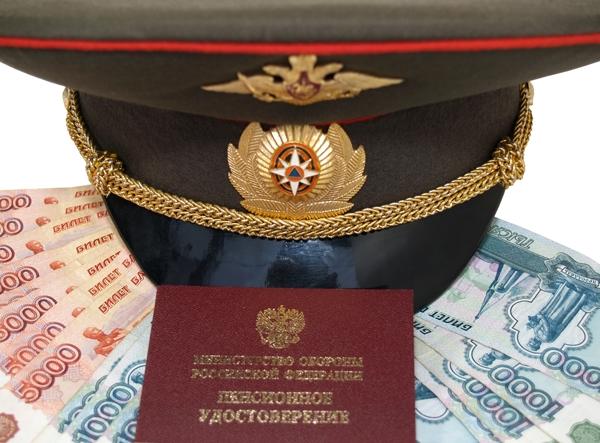
Since February 2020, amendments have been made to legislative acts that have reduced indexation periods to once a year.
What is more profitable than NSO in rubles or services?
Many citizens of the appropriate category are faced with the problem of determining what is more profitable for them - to receive a set of social services in cash or in kind.
As the practice of many branches of the Pension Fund of the Russian Federation shows, most of the “beneficiaries” prefer to receive their benefits in rubles.
So, if the cost of medicines does not exceed 700 rubles per month, then veterans prefer to receive funds in cash.
According to the latest changes, the range of social services includes:
- provision of medicines (889.66 rubles);
- vouchers to sanatoriums (137.63 rubles);
- free travel on public transport (127.77 rubles).
Citizens have the right to receive NSO in rubles in whole or in part, choosing for themselves only those items of expenditure that they really need.
What benefits are provided?
Benefits for combat veterans are established both at the federal and regional levels of each individual subject of the federation. At the same time, federal benefits for combatants are mandatory. Regional ones remain at the discretion of local authorities.
The following support measures are provided at the federal level:
- monthly cash payment;
- compensation for housing and communal services in the amount of 50%;
- provision of medical care;
- preferential provision of prostheses and prosthetic and orthopedic products;
- benefits;
- preferential pension provision;
- providing housing at the expense of the federal budget for those in need of improved living conditions;
- preferential payment for renting premises;
- installation of a home telephone out of turn;
- preferential position upon entry into housing, housing construction, garage cooperatives, priority right to purchase garden or vegetable plots of land;
- annual paid leave at a convenient time of year;
- additional leave of 35 days without pay by the employer;
- obtaining vocational education or additional professional education at the expense of the employer;
- priority right to use all types of services of communication institutions, cultural, educational, sports and recreational institutions;
- the right to priority purchase of tickets for all types of transport;
- priority provision of vouchers to sanatorium and resort institutions if indicated (for persons who served military units of the Armed Forces on the territory of other states, persons sent to work in Afghanistan and Syria).
Combat veterans (CVVs) are divided into several categories by federal legislation. Some of them are not eligible to receive certain types of benefits.
Veteran categories
State assistance from the state to veterans of various military operations is regulated by Law No. 5-FZ. This normative act states that all veterans are divided into 3 groups, depending on where and how they fought. So:
- The first category includes military personnel who were directly involved in demining territories that were previously part of the republics of the countries of the former USSR. Also included here are those citizens who fulfilled their combat and military duty in other states in which hostilities were taking place and in which the USSR took part;
- The second category includes pilots who performed their military duty in countries such as Afghanistan, Chechnya, Vietnam, Syria and other countries during certain periods. In addition, the pilots must have received injuries, contusions or other injuries while performing their direct duties in wartime;
- The law includes in the third category citizens who carried out not military, but labor activities in those countries indicated above, in the presence of hostilities during specific periods.

The law on combat veterans, as amended, provides a complete list of countries in which hostilities took place at different times, and in which the USSR or Russia took part in various periods of history. This is not only Afghanistan and Chechnya. The list of countries also includes:
- Tajikistan;
- South Ossetia;
- Abkhazia;
- Syria;
- Ethiopia;
- Other countries.
If a person is, in one way or another, connected with the actions that were carried out in these countries, and he can confirm this fact with documents, he needs to apply for additional benefits and preferences.
Housing benefits

Benefits for combatants (UBC) for payment of housing and communal services imply compensation in a certain amount upon payment.
- for renting residential premises;
- for the maintenance of residential premises, including management services for an apartment building, for the maintenance and ongoing repairs of common property;
- contribution for major repairs of common property in an apartment building.
The amount of compensation is set at the federal level.
Benefits are provided regardless of the housing stock and also apply to family members of military veterans living with them. To receive benefits for housing and communal services, you must contact the Department of Social Protection of the Population at your place of residence or the MFC with several documents:
- UBD or UBD certificate;
- statement;
- identification documents of the beneficiary and his family members;
- documents confirming family ties with residents;
- receipts for payment of housing and communal services for the last month;
- bank account number.
Payment for renting premises
If a citizen with preferential status lives in premises under a social rental agreement, then he is entitled to compensation in the amount of 50% of the amount of the agreement. For example, if the payment for the maintenance of the premises is 2000 rubles per month, then the compensation will be 1000 rubles.
To receive this benefit, you must contact the Social Security Administration with documents to write an application.
The documents you will need are:
- combat veteran certificate;
- identification document of the beneficiary;
- social rental agreement;
- bank account number.
The processing time for an application is on average 15-30 days, after which the applicant is either awarded compensation or receives a refusal. If approved, compensation for renting residential premises will be returned to the citizen’s account monthly.
If the USZN issues a refusal to the applicant, then such a decision can be challenged. For example, if a citizen is sure that he was refused unlawfully. In this case, all documents must be submitted to a higher authority or court.
Housing
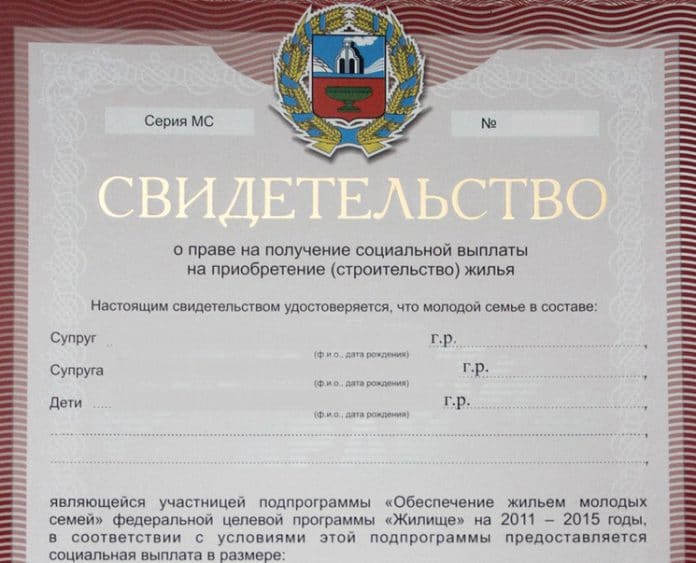
To implement such a measure of support for veterans, federal legislation enshrines the right of subjects to independently determine the procedure for providing funds for the construction or purchase of residential premises by veterans in need of improved housing conditions.
This measure most often involves the issuance of a certificate or certificate of subsidy for the purchase of residential property. At the same time, the legislation clearly establishes that the size of the premises for which the certificate is issued is 18 square meters. The benefit is provided exclusively to the combat veteran himself, and the benefit extends to his family in the event of the death of a veteran or disabled combat veteran while performing military service duties, death in captivity, or recognition as missing in combat areas.
The final size of the certificate is influenced by the cost of one square meter of living space in a specific subject of the Federation. In 2020, this cost was 43,374 rubles.
How to get a benefit
To receive a cash payment, you must contact the Administration at your place of residence with several documents:
- passport;
- veteran's certificate;
- a certificate from Rosreestr confirming the absence of residential premises;
- statement.
The period for reviewing documents is 30 calendar days. Municipal authorities create lists of needy beneficiaries, which are subsequently transferred to the regional body responsible for providing housing. Some regions may require additional documents.
The money is not given to the applicant; it is usually transferred to the account of the seller of the residential premises. You can purchase housing both on the secondary and primary markets.
The certificate can be used as part of the payment for a purchase. The remaining amount, if the apartment or house is larger than established by law, the citizen can contribute independently from personal or credit funds.
A number of requirements are also imposed on the purchased housing; it must comply with technical and sanitary and hygienic standards, be well equipped; if housing under construction is purchased, then most often the regions impose a requirement that such housing is at least 70% ready.
Medical benefits

They cannot deny him this right.
Moreover, it means turning to specialists to provide medical care out of turn with a VBD certificate.
In some regions, additional benefits have been established for the purchase of medicines. Moreover, in some areas this support measure is implemented in the form of a discount on medicines, and in others – in the form of compensation.
Prosthetics
BD veterans have the right to preferential provision of prosthetics and prosthetic and orthopedic products. However, the list does not include dentures. That is, if a citizen who belongs to a preferential category is entitled to prostheses of a different kind for medical reasons, then these prostheses are paid for from the federal budget. The basis for granting such a benefit is the conclusion of the medical commission of a medical organization that provides medical and preventive care to veterans.
To implement this social support measure, you must contact the Administration at your place of residence.
If a citizen independently purchased a prosthesis with his own funds, then he is entitled to compensation in the amount of the cost of this product. To exercise your right, it is enough to contact the Department of Social Protection of the Population.
Benefits for large families in 2020
A large family is one in which at least three minor children are raised (including adopted ones). In the Orenburg region there are over 26,000 such families.
Did you know: in the Orenburg region the birth rate of children is higher than in other regions of the country.
Download text: Law of the Orenburg Region “On measures of social support for large families” (.docx)”
The authorities of the Orenburg region provide large families with the following privileges:
- Discount on housing and communal services (minimum 30%) and compensation for the purchase of fuel (wood or coal) if the family lives in a house not connected to centralized heating.
- Free purchase of medicines for children under 6 years of age.
- Free travel on public transport.
- Receive free school and sports uniforms for children, breakfasts and lunches throughout the entire period of study.
- Placement on a preferential queue when entering kindergarten.
- Exemption from transport tax and registration fee for entrepreneurs.
- Preferential loans.
- Free purchase of tickets to cultural places (circuses, theaters, exhibitions) - once every month.
- Allocation of a plot of land out of turn for conducting gardening, farming or commercial activities or for building a residential building. Attention: the benefit is valid once and is provided only to those who have been registered in the Orenburg region for at least 10 years.
- Material payment. If a 3rd child (and subsequent ones) appears in the family, then benefits are paid for him up to 3 years.
- Targeted assistance to large families living in rural areas. In the Orenburg region, a law was introduced that allows the authorities to provide such families with social assistance in the form of cash payments for household development.
- Early retirement for mothers of many children. If there are 3 children in a family, then the mother can retire at 57 years old, if there are 4 children, then at 56 years old, and if there are 5 or more, then at 50 years old.
- Receiving the Order of Parental Glory. Issued to families raising at least 7 children. Those who receive such a medal can expect to receive a one-time benefit in the amount of 100,000 rubles.
An application for such benefits must be submitted to:
- Pension Fund;
- tax;
- social service for the protection of the population;
- MFC;
- local administration.
Cash payments and benefits

In 2020, the monthly payment amounted to 2,972.82 rubles, taking into account GST.
The size of the monthly cash payment is indexed once a year from February 1, taking into account rising consumer prices.
How to receive payment
By law, the obligation to pay is assigned to the Pension Fund of the Russian Federation. Therefore, to receive benefits, you must contact the territorial office at your place of residence with a certificate and application. The Pension Fund of the Russian Federation has entered into an agreement to provide this service to the MFC; they also accept applications for payment.
It is possible to submit an application electronically through a personal account on the government services portal, and subsequently through the personal account of the insured person on the official website of the Pension Fund.
Social benefits
Some citizens fall not only under the category of BD veterans, but also under other categories that are entitled to social benefits. In this case, payments are made exclusively on one of the grounds at the choice of the citizen himself or, based on data about which benefit is larger in size.
Funeral services
In the event of the death of a citizen who has a UBD or VBD certificate, relatives have the right to financial assistance from the state for the funeral of the veteran.
Services for burial, delivery of the body and its preparation for burial, cremation, production and installation of the monument are carried out with funds from the federal budget. To receive benefits, you must contact the Pension Fund.
Relatives can independently choose the burial place, even if it is located outside the place of permanent or primary residence of the deceased.
Benefits for combat veterans: what is required, list
Among the government benefits are the following:
- receiving additional cash payments;
- return of previously paid amounts for utilities for a certain period;
- installation of a home telephone for communication;
- funeral services;
- undergoing vocational training;
- preferential purchase of tickets for travel by motor transport, etc.
Municipalities have the right to introduce other benefits. The main requirement is that the benefits and privileges established at the level of federal legislation are not infringed.


